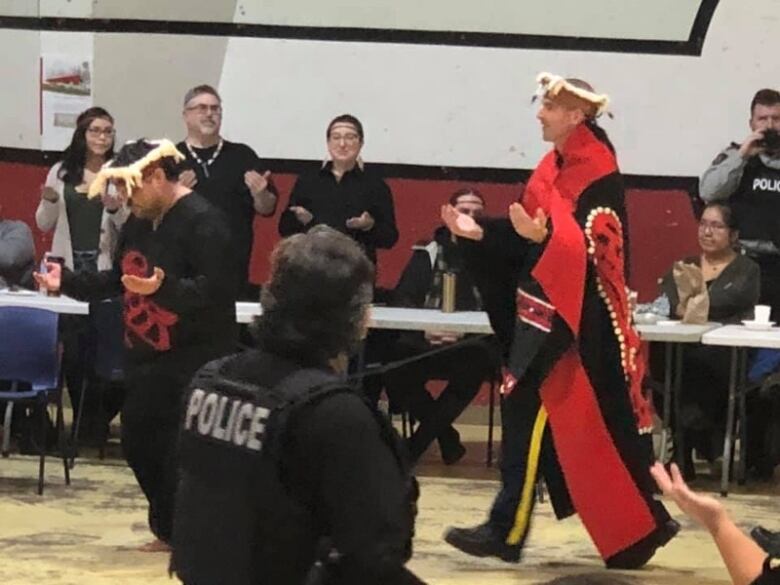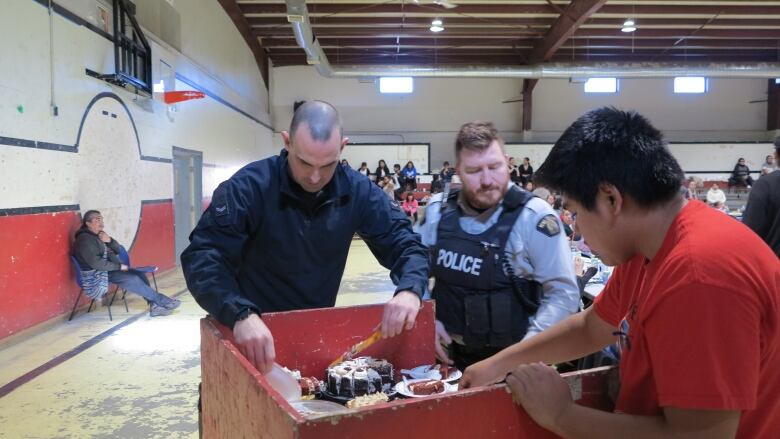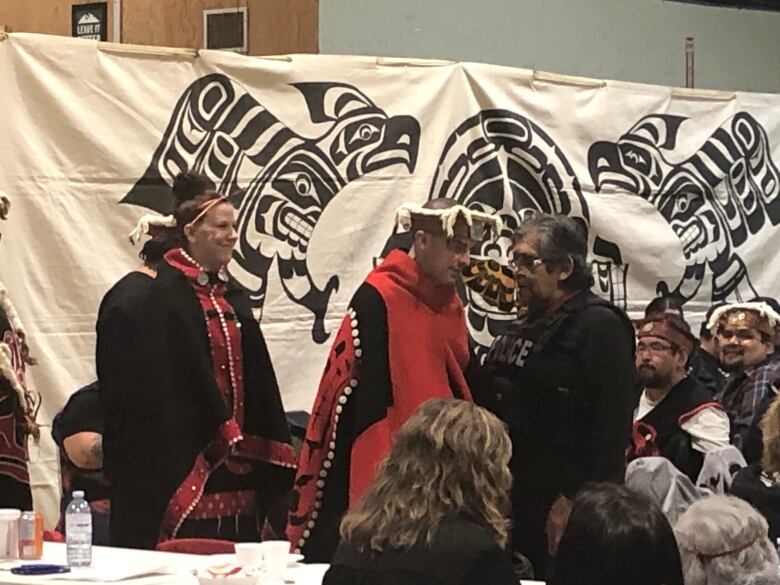Hereditary chief and RCMP corporal model friendship, cooperation in Port Hardy, B.C.
Chief Thomas Henderson says neighbouring First Nations want his advice to improve relationship with RCMP

When'Nakwaxda'xwhereditary Chief Thomas Henderson decided to pass his chiefdom downto his son, he knew his whole community had to be involved in the potlatch including the police.
Considering the RCMP's involvement with the potlatch ban, residential schools, disputes over land rights, and the ongoing issue of over-representation of Indigenous people in Canadian prisons, it might seem surprising that a hereditary chief would want to invite police officers to his own ceremony.
But Henderson and the RCMP in Port Hardy, B.C., have developed an amicable relationship over the last five years. In fact, he even considers one RCMP officer, Corporal Chris Voller, to be like family.
"I don't call him corporal, I call him brother," saidHenderson. "I tell him to come stand beside me and address the elders."
Corporal Voller says they even dance together during community events, including potlatches.
"I do a dance with him where he wears my police regalia and I'm dressed in his traditional regalia," Voller said. "Family is a huge part of Indigenous culture, and after a while, if you play your cards right, you're considered family."

Recognizing a traumatic history
In addition to policing the town, Port Hardy RCMP are in charge of policing three local First Nations: the Kwakiutl, the Quatsino, and Gwa'sala-'Nakwaxda'xw.
Henderson says the people of his nation, Gwa'sala-'Nakwaxda'xw (which are two First Nations amalgamated into one), have had an especially challenging history. In 1964, the people of his nations were forcibly relocated to Port Hardy from their traditional homeland on the central coast of mainland British Columbia.
Voller says recognizing and genuinely understanding this history is crucial to his job.
"Those 15-year-olds who in 1964 were relocated, are now the elders, they are the leaders of these communities so the scars that are left are very real," said Voller. "These are not things that happened generations ago and the ghosts are gone; these individuals are the ones we look in the eyes and we deal with onday-to-day business."

Mending a broken relationship
Henderson says for decades, his community did not have a good relationship with the police.
"There was a constant battle with the RCMP and us," saidHenderson. "What used to happen is when our people were still really down in the dumps with drinking, RCMP would throw them in the police car and haul them off to jail."
But in 2015, a change in RCMP personnel helped lead to a different approach in policing. Corporal Voller was one of the new members who came to Port Hardy.
"When an [officer] arrives here, we take them to the traditional territory of all of our nations, and we have the elders explain their feelings, what they've done," said Voller.
In addition, Voller says he has personally taken the time to learn bits of each Indigenous language in his community and go to lunch with elders.
Henderson is often asked for advice by neighbouring First Nations on how to improve the relationship with the RCMP.
"I tell them to invite the RCMP from the detachment and have them be part of what you do in your community," said Henderson. "It starts a good bond rather than us fighting all the time."

Voller says he's driven by the leaders he has befriended in the Indigenous community.
"I didn't live during the times when there was relocation here, but some of my chiefs did," he said. "They still come to the table every day, looking to work with us, so I think it's their strength that motivates us to continue because if they've gone through those things and they're still willing to work with us, it's hard not to respond to that energy."












_(720p).jpg)


 OFFICIAL HD MUSIC VIDEO.jpg)
.jpg)



























































































